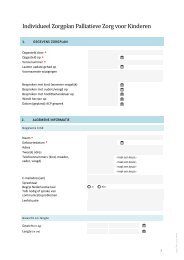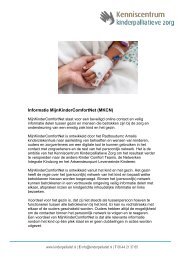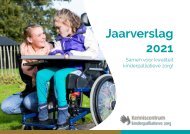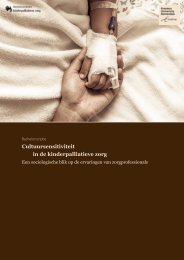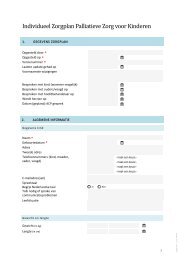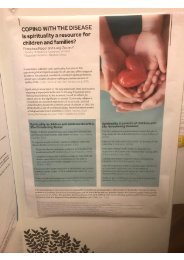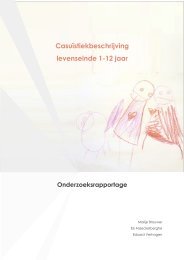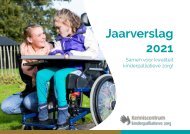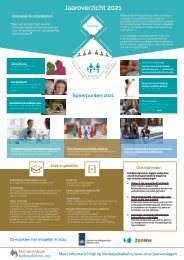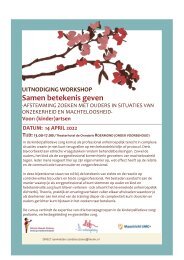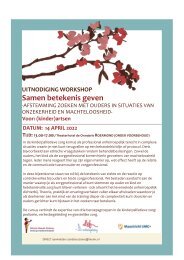EAPC Atlas of Palliative Care in Europe 2019
Conclusion: PC health policies developed in recent years have promoted vigorous development across Europe. Preliminary data on the integration of PC into different fields are encouraging though inequalities between countries and sub-regions persist. Further comparative analysis exploring factors leading to uneven progress may inform strategies to provide PC for all people in need. Per land is de stand van zaken van de (kinder)palliatieve zorg weergegeven.
Conclusion: PC health policies developed in recent years have promoted vigorous development across Europe. Preliminary data on the integration of PC into different fields are encouraging though inequalities between countries and sub-regions persist. Further comparative analysis exploring factors leading to uneven progress may inform strategies to provide PC for all people in need.
Per land is de stand van zaken van de (kinder)palliatieve zorg weergegeven.
Create successful ePaper yourself
Turn your PDF publications into a flip-book with our unique Google optimized e-Paper software.
PRESENTATION<br />
Note from the authors<br />
B<br />
In 2017, four years after the last edition<br />
<strong>of</strong> the <strong>EAPC</strong> <strong>Atlas</strong> <strong>of</strong> <strong>Palliative</strong><br />
<strong>Care</strong> <strong>in</strong> <strong>Europe</strong>, we decided that it<br />
was time to conduct a new assessment<br />
<strong>of</strong> palliative care development with<strong>in</strong><br />
the World Health Organisation (WHO)<br />
<strong>Europe</strong>an Region. The experience we have<br />
gathered over the recent years mapp<strong>in</strong>g<br />
palliative care progress <strong>in</strong> Lat<strong>in</strong> America,<br />
Africa and the Eastern Mediterranean<br />
countries led us to wonder about the best<br />
way <strong>of</strong> evaluat<strong>in</strong>g not only development but<br />
also the <strong>in</strong>tegration <strong>of</strong> PC <strong>in</strong>to health systems.<br />
We set ourselves on a quest to scientifically<br />
approach<strong>in</strong>g this issue.<br />
For the present publication, we improved<br />
our methodology aimed at gather<strong>in</strong>g the<br />
most comprehensive and up-to-date <strong>in</strong>formation<br />
on the region. The selection <strong>of</strong> the<br />
<strong>in</strong>dicators to be used <strong>in</strong> the <strong>Atlas</strong> was a crucial<br />
po<strong>in</strong>t. We started by conduct<strong>in</strong>g a systematic<br />
review to identify all national-level<br />
<strong>in</strong>dicators used <strong>in</strong> the last ten years <strong>in</strong><br />
cross-national studies around the world.<br />
These <strong>in</strong>dicators were clustered follow<strong>in</strong>g<br />
the four WHO dimensions: policies, use <strong>of</strong><br />
medic<strong>in</strong>es, education and service provision.<br />
We then <strong>in</strong>vited a committee <strong>of</strong> 24<br />
<strong>in</strong>ternational experts on palliative care<br />
development to take part <strong>in</strong> a two-round<br />
Delphi process to assess these <strong>in</strong>dicators<br />
and achieve consensus on the selection<br />
<strong>of</strong> the best ones. Twenty–five <strong>in</strong>dicators<br />
result<strong>in</strong>g from this process were used <strong>in</strong><br />
the mak<strong>in</strong>g <strong>of</strong> this <strong>Atlas</strong>.<br />
Simultaneously, we studied the <strong>in</strong>tegration<br />
<strong>of</strong> palliative care <strong>in</strong> the region and chose<br />
paediatric palliative care, long-term care<br />
facilities, primary care, volunteer<strong>in</strong>g, cardiology<br />
and oncology as fields to assess.<br />
We contacted experts <strong>in</strong> these fields and<br />
<strong>in</strong>vited them to enrol <strong>in</strong> a design and selection<br />
process <strong>of</strong> specific <strong>in</strong>dicators for each<br />
one. Thirty-three <strong>in</strong>dicators were used on<br />
the mak<strong>in</strong>g <strong>of</strong> the chapters assess<strong>in</strong>g palliative<br />
<strong>in</strong>tegration. Additionally, we created<br />
networks <strong>of</strong> key <strong>in</strong>formants to respond<br />
them. Besides, a dedicated study on palliative<br />
care education at the undergraduate<br />
level, and on <strong>in</strong>tegration <strong>of</strong> palliative care<br />
and oncology were conducted.<br />
This edition present data gathered on the<br />
development <strong>of</strong> palliative care with<strong>in</strong> the<br />
region. As a result, it provides a regional<br />
overview <strong>of</strong> the current progress <strong>of</strong> palliative<br />
care <strong>in</strong> the section Development and<br />
<strong>in</strong>tegration <strong>of</strong> <strong>Palliative</strong> <strong>Care</strong> across <strong>Europe</strong><br />
(chapters 1 to 11). Separately, national<br />
pr<strong>of</strong>iles <strong>of</strong> each country are presented <strong>in</strong><br />
the section Development <strong>of</strong> <strong>Palliative</strong> <strong>Care</strong><br />
at the country-level.<br />
This publication presents the first regional<br />
study <strong>of</strong> its k<strong>in</strong>d us<strong>in</strong>g consensus-based<br />
<strong>in</strong>dicators for the assessment <strong>of</strong> specialised<br />
palliative care development and <strong>in</strong>dicators<br />
designed specifically to explore the<br />
state <strong>of</strong> <strong>in</strong>tegration <strong>of</strong> palliative care with<strong>in</strong><br />
Primary <strong>Care</strong>, Paediatric palliative care,<br />
Long-Term <strong>Care</strong> Facilities, Cardiology and<br />
Oncology with<strong>in</strong> the region. All <strong>of</strong> it <strong>in</strong> l<strong>in</strong>e<br />
with WHO and provid<strong>in</strong>g a handful <strong>of</strong> helpful<br />
new basel<strong>in</strong>e <strong>in</strong>dicators. It provides<br />
<strong>in</strong>formation on 94% (51/54) <strong>of</strong> countries<br />
<strong>of</strong> the region and enables cross-national<br />
comparison on the progress <strong>of</strong> PC<br />
among countries. Information was provided<br />
by key <strong>in</strong>formants <strong>in</strong> each country, which<br />
consisted <strong>of</strong> leaders <strong>of</strong> national palliative<br />
care associations, members <strong>of</strong> the M<strong>in</strong>istry<br />
<strong>of</strong> Health, or experts with<strong>in</strong> each country<br />
def<strong>in</strong>ed as either the leader <strong>of</strong> an important<br />
hospice or palliative care service. Peer<br />
review, literature review and ATLANTES<br />
Research Programme’s databases were<br />
used to verify <strong>in</strong>formation given by experts.<br />
Therefore, the <strong>EAPC</strong> <strong>Atlas</strong> is present<strong>in</strong>g with<br />
the best estimates available.<br />
Follow<strong>in</strong>g this <strong>EAPC</strong> <strong>Atlas</strong>, we will cont<strong>in</strong>ue<br />
to work on secondary analyses <strong>of</strong> the<br />
data we have collected for publication <strong>in</strong> a<br />
series <strong>of</strong> scientific papers and reports. We<br />
will focus on dissem<strong>in</strong>at<strong>in</strong>g this <strong>in</strong>formation<br />
to key experts <strong>in</strong> <strong>Europe</strong>an countries<br />
so that it may be used for advocacy efforts<br />
<strong>in</strong> work<strong>in</strong>g with governments and M<strong>in</strong>istries<br />
<strong>of</strong> Health.<br />
This ambitious project was made possible<br />
thanks to the collaboration <strong>of</strong> over 450 palliative<br />
care pr<strong>of</strong>essionals across <strong>Europe</strong>,<br />
who have contributed <strong>in</strong> various mean<strong>in</strong>gful<br />
ways. We truly thank all <strong>of</strong> those who<br />
volunteered their time for the project. We<br />
thank the key <strong>in</strong>formants, country and<br />
sub-specialty experts, and <strong>in</strong>ternational<br />
committee members for all <strong>of</strong> their assistance<br />
<strong>in</strong> mak<strong>in</strong>g this <strong>EAPC</strong> <strong>Atlas</strong> <strong>of</strong> <strong>Palliative</strong><br />
<strong>Care</strong> a reality as well as their tireless work <strong>in</strong><br />
build<strong>in</strong>g up palliative care <strong>in</strong> their respective<br />
countries.<br />
<strong>EAPC</strong> <strong>Atlas</strong> <strong>of</strong> <strong>Palliative</strong> <strong>Care</strong> <strong>in</strong> <strong>Europe</strong><br />
14




